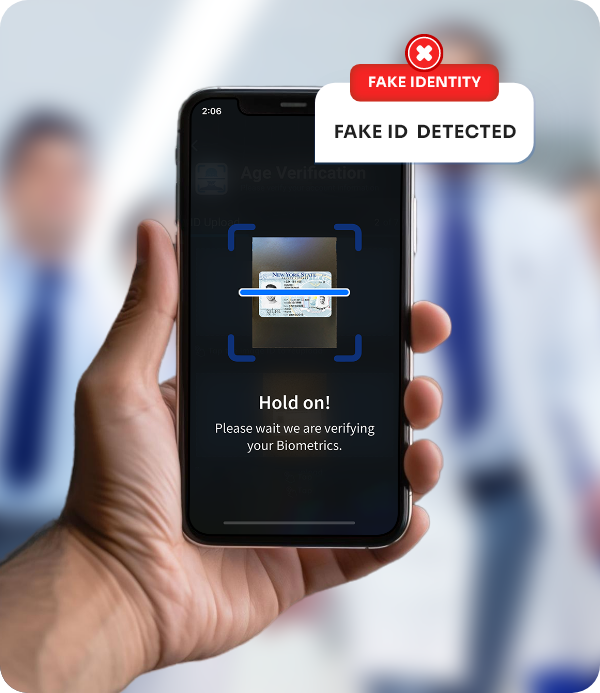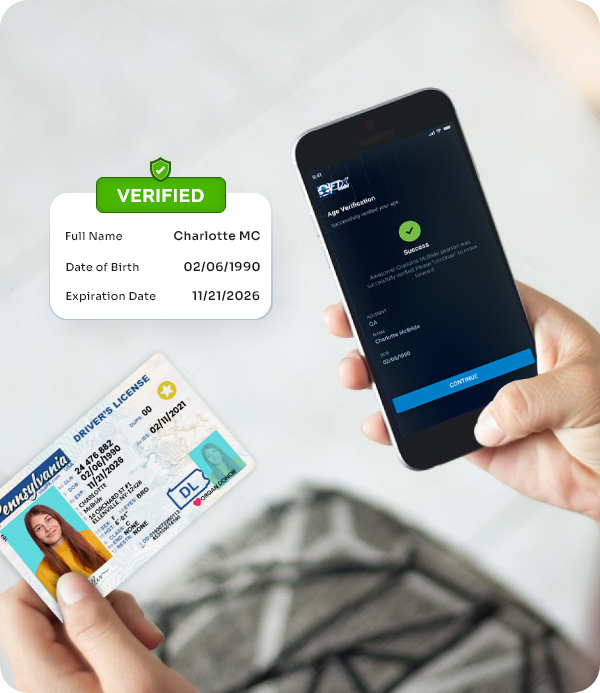
Smooth Know Your Patient (KYP) Verification Process
We’re shaping the future of healthcare. Our AI-driven identity verification process for your medical company guarantees top-notch care for patients quickly and safeguards them against fraud.
- Verify patients in no time
- Combat medical identity theft
- Check patient ages to stop access to harmful substances
- Authenticate medical insurance claims

Use Our ID Verification Process to Prevent Medical Fraud
- Check documents instantly to detect insurance fraud
- Use our patient age verification technology to stop illegal medicine distribution in its tracks
- Keep data safe by following regulatory compliance standards
- Stop medical identity theft with instant ID verification

Provide Prescriptions Online with ID & Age Verification
- Authorized sales of prescriptions
- Verification of a patient’s age and identity helps in the legal distribution of medications
- AI-based ID verification and patient age verification prevent fraud and non-compliance penalties
- Ensure medications are dispensed safely and responsibly
FTx Identity's Role in Verifying Digital Identities for Healthcare
The healthcare industry is on a mission to deliver top-notch care to every corner of the globe. Enter FTx Identity: the game-changer for medical service providers and insurers, guaranteeing that they always reach the right patients.
-
6s
Get Instant Verification
-
10K+
Documents Covered
-
95%
Verified on the First Try
-
40
Languages Supported
Automate Patient Intake
Verify a new patient’s identity in real-time with our healthcare identity verification process before they visit any clinic. With FTx Identity, healthcare providers can efficiently and accurately verify the age of patients to ensure they receive appropriate care and access to age-appropriate treatments.
Protect Health Records
FTx Identity makes the onboarding process easier and more efficient by quickly verifying user identities. This allows patients to access their health records and talk to healthcare providers faster, improving the patient experience and leading to better healthcare results.
Counter Identity Fraud
FTx Identity blocks minors and anyone with questionable or outdated ID from shopping in-person at your clinic or dispensary, or online. By implementing our age verification technology, businesses can also gain valuable insights into their patient base.
Instant Check-In
Our innovative AI-driven verification process cuts down on manual tasks, making the registration process faster and more secure. This technology allows businesses to speed up user onboarding and cut registration costs, boosting efficiency and saving money.
Safeguard Your Reputation
Fraudulent transactions can hurt your market reputation and relationships with payment partners, possibly leading to account closures. FTx Identity helps prevent chargebacks, ensuring you remain trustworthy for patients and businesses.
Secure Platform
FTx Identity can stop medical identity fraud. It uses patient verification checks to help healthcare businesses secure their platforms and maintain integrity in the healthcare sector. FTx Identity offers an advanced age verification process, ensuring only authorized individuals have access to sensitive medical information.
Experience Digital Identity Verification for Healthcare with FTx Identity
FTx Identity’s identity verification and authentication features allow for quick and accurate patient identification.


Keep Up With The Regulations Of Your Industry
FTx Identity enhances your age verification process, easily fulfilling your legal requirements, no matter the country or business field
Fast, Simple, and Secure
Digital Age Verification
Need to verify age quickly and securely? Whether you’re in-store, online, or both, we’ve got what you need. Our solutions ensure compliance while making the process hassle-free for you and your customers!
Frequently Asked Questions
Identity verification is crucial in healthcare for several reasons:
- Protecting sensitive information: Healthcare organizations handle a lot of personal and confidential information, including medical records and financial details. Accurate identity verification ensures that only authorized individuals have access to this information, protecting it from potential data breaches or misuse.
- Preventing medical fraud: With the rise of identity theft and medical fraud, implementing identity verification processes can help healthcare organizations verify the legitimacy of patients and prevent fraudulent activity.
- Ensuring proper treatment: Inaccurate patient identification can lead to misdiagnosis or incorrect treatment, which can have serious consequences. By verifying a patient’s identity, healthcare providers can ensure they are providing care to the right individual.
- Complying with regulatory standards: Many countries have laws and regulations in place to protect patient privacy and ensure secure handling of personal information. Identity verification is a crucial aspect of compliance with these standards.
Identity verification technology has several benefits for the healthcare industry, including:
- Enhanced patient safety: By accurately verifying a patient’s identity, healthcare facilities can ensure that patients receive the correct treatment and medication, reducing the risk of medical errors.
- Improved data security: Identity verification technology helps protect sensitive patient information by ensuring only authorized individuals have access to it.
- Streamlined operations: With automated identity verification processes, healthcare facilities can reduce administrative tasks, freeing up staff to focus on patient care.
- Regulatory compliance: The healthcare industry is heavily regulated, and implementing identity verification technology can help facilities comply with regulations such as HIPAA and prevent potential legal consequences associated with non-compliance.
There are various types of identity verification technology used in healthcare, including:
- Biometric verification: This type of identity verification uses unique biological characteristics, such as fingerprints or facial recognition, to confirm a patient’s identity.
- Document authentication: Healthcare facilities may use document authentication technology to verify the authenticity and validity of government-issued IDs presented by patients.
- Two-factor authentication: This method combines two forms of verification, such as a password and a biometric scan, to ensure the identity of the individual accessing patient information.
- Knowledge-based verification: In this type of identity verification, individuals are asked personal questions that only they should know the answers to, such as their social security number or previous addresses.
Patients may be hesitant about sharing personal information and undergoing identity verification in healthcare settings. To make patients feel more comfortable, healthcare facilities can:
- Clearly communicate the purpose of identity verification: By explaining why identity verification is necessary for their safety and security, patients can better understand the importance of this process.
- Ensure data privacy: Patients should be assured that their information will be kept confidential and used only for legitimate purposes.
- Provide a secure platform: Using secure, encrypted systems for identity verification can also help alleviate patient concerns about the security of their personal information.
